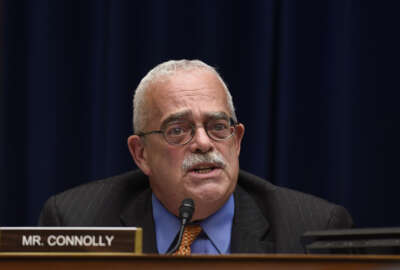
Administration gets bipartisan beating over OPM-GSA merger, lack of legal analysis
The Trump administration said Thursday it's still preparing a legal analysis for its proposed merger of the Office of Personnel Management with the General Services...
The Trump administration doesn’t yet have a legal analysis to justify why it believes it can merge the Office of Personnel Management with the General Services Administration.
Attorneys at OPM are still developing that analysis, even as the administration had told Congress it needed a commitment to merge the two agencies by June 30 or else risk the potential for furloughs of OPM employees.
“The legal analysis of what statutory authorities exist today to enact parts of the transaction are still undergoing,” Stephen Billy, deputy chief of staff for OPM, told members of the House Oversight and Reform Government Operations Subcommittee on Thursday.
Subcommittee members gave Billy and OPM a bipartisan beating for what they described as a continued lack of information and detail from the Trump administration about its rationale and plans for the agency’s merger with GSA.
Thursday’s hearing was designed to give subcommittee members an opportunity to, in a public setting, hear from officials at OPM about agency’s compliance with congressional inquiries related to the merger — and with leaders at GSA and the FBI about the latter agency’s headquarters.
Rep. Gerry Connolly (D-Va.), the subcommittee’s chairman, said the panel had received 524 pages of documents from the administration on the OPM-GSA merger to date, The latest total is more than what the subcommittee received back in May ahead of acting Director Margaret Weichert’s hearing on the administration’s legislative proposal. Connolly said the documents generally weren’t responsive to requests he had made back in April.
Connolly and committee Democrats had asked for plans, a timeline, proposed inter-agency agreements and a wide array of communication, meeting notes and other reports prepared by outside consultants who are working on the merger.
Related Stories

Congress not yet convinced of Trump administration’s proposed OPM-GSA merger
“We asked just tell us the legal authority. Cite the legal authority that you say you have to go forward. That’s it. Redacted,” Connolly said. “That’s called responsive? That’s part of that just voluminous 400 pages that they broke sweat over to get us? Any reasonable member of Congress can look at that and realize we have a problem.”
“Your point is right in line with what the concern is,” Rep. Jody Hice (R-Ga.) said in response. “Mr. Billy, you’re not doing your job. There is a stall. It does not take multiple people to get 400 pages or 500, whatever it is, to questions that have no reason to be redacted.”
Billy said the agency was using a Six Sigma “tollgate” process to develop a legal analysis for the merger. Administration officials are using a similar process to evaluate the merge’s impact on OPM customers and other stakeholders.
The administration first publicly revealed a rough sketch of its proposal to reorganize and merge OPM with GSA nearly one year ago.
In questioning Billy on administration’s legal analysis for the OPM-GSA merger, Rep. Jamie Raskin (D-Md.) asked why the agency would redact that information in its correspondence with Congress — and if officials were certain the merger wouldn’t violate existing law.
“There’s an assumption that some parts likely are able to be executed under current statutory authority. We are going through that analysis. There are different authorities that could potentially move different pieces, how they would affect people versus resources.”
“OPM made a very significant decision essentially to dismantle itself or dissolve itself without first obtaining any formal opinion as to the legality of this decision,” Raskin said. “My first take on this, having looked at some of the legal authorities, is that the proposal is likely illegal. The administration came up with a plan and never took care to vet it or assess its lawfulness.”
Hice and Raskin weren’t the only members who expressed frustration with the level of cooperation from the administration on the OPM-GSA merger.
In his opening statement, Government Operations Subcommittee Ranking Member Mark Meadows (R-N.C.) acknowledged Congress needs to do something to improve OPM’s financial situation. The agency faces a $70 million shortfall when the National Background Investigations Bureau and its security clearance business transfers to the Pentagon on Oct. 1, a move that he said he doesn’t agree with.
“I was very troubled at the IT capacity of OPM,” Meadows said. “We have to do something, whether that’s consolidation, whether that’s moving to GSA. We have a third-world computing system for OPM. No wonder we got hacked.”
Latest Workforce News
Meadows said news of the potential for OPM furloughs dropped during his visit to the agency last week.
“It caught me by surprise,” he said. “I’m having a great visit at OPM… and I come back to have to answer reporters’ questions about furloughing employees. It embarrassed me, because I felt like some of those OPM employees may have thought that I knew about that, and I didn’t. It’s inconsistent with where I am philosophically. The more information, Mr. Billy, you can get us… the better off we’ll be.”
“Absolutely, Congressman,” Billy said. “We’re redoubling our efforts to get the information for you and the Chairman on this.”
Thursday’s hearing came one day after the House passed 2020 appropriations for OPM and other agencies in the financial services and general government spending bill. The measure doesn’t include the $50 million the administration had initially requested to carry out the merger. It also includes specific language that would prevent the administration from merging OPM with GSA and a block on furloughs for the agency’s employees.
“This half-baked proposal is going to be dead on arrival here on Capitol Hill,” Connolly said.
Copyright © 2025 Federal News Network. All rights reserved. This website is not intended for users located within the European Economic Area.
Nicole Ogrysko is a reporter for Federal News Network focusing on the federal workforce and federal pay and benefits.
Follow @nogryskoWFED








